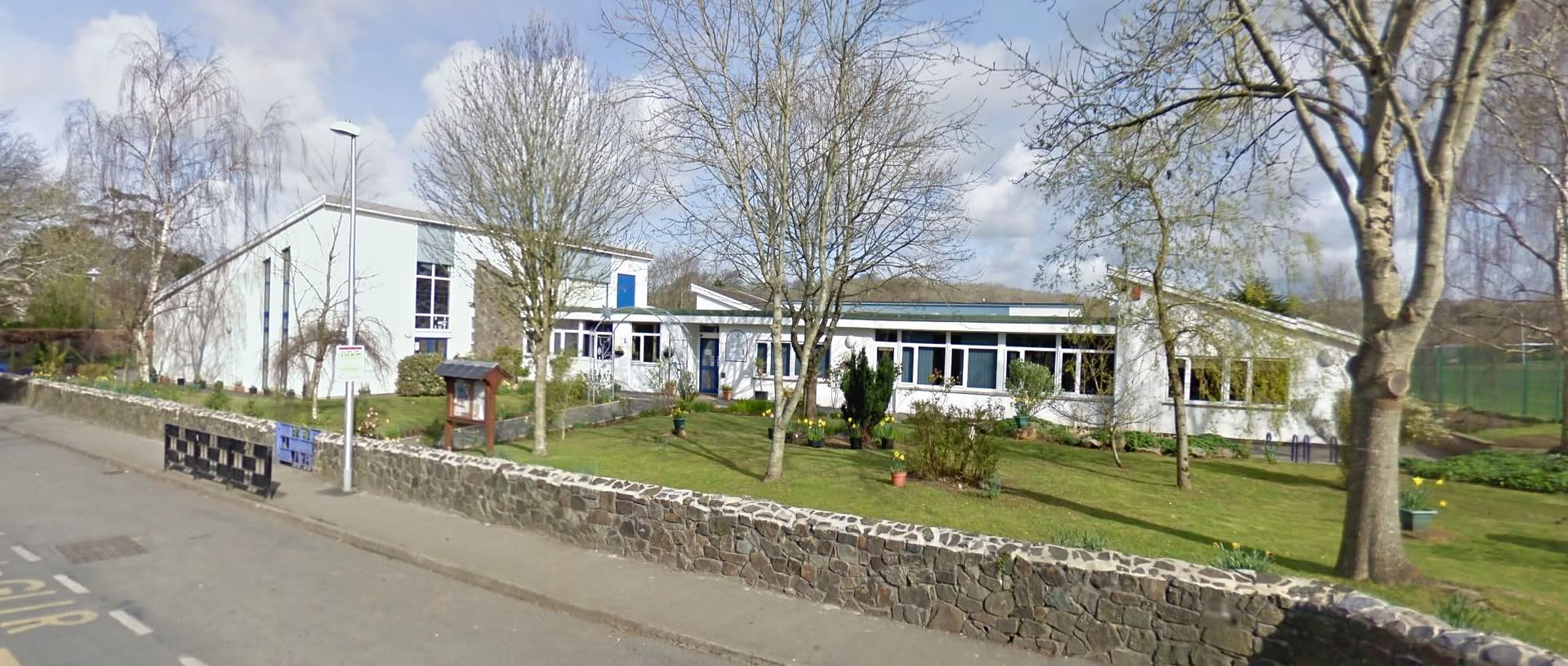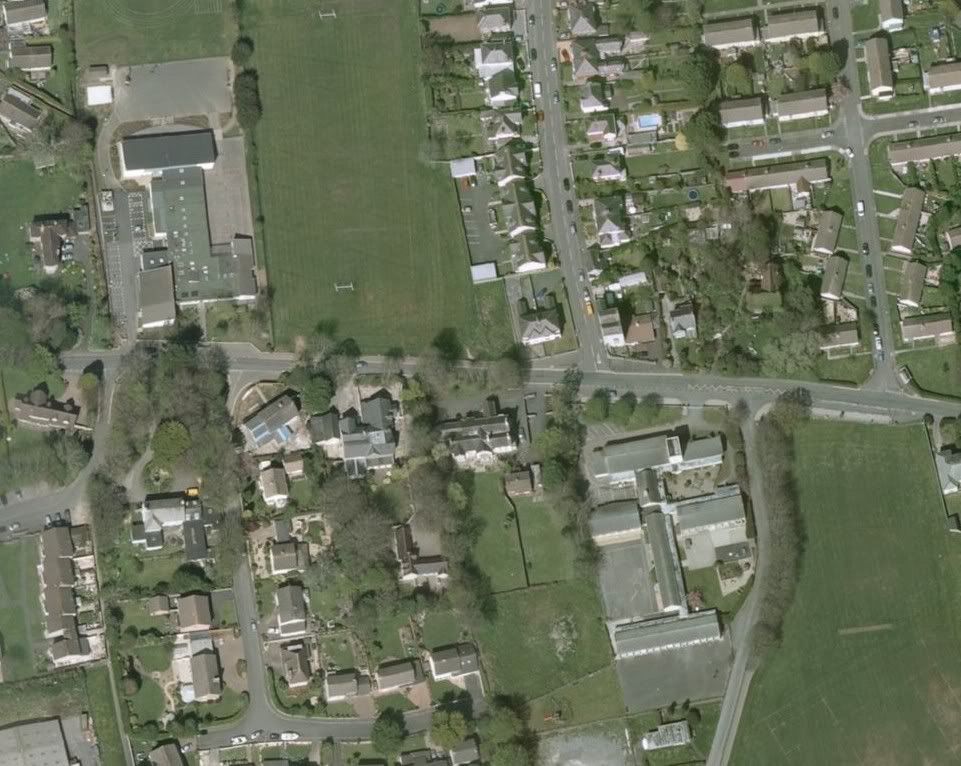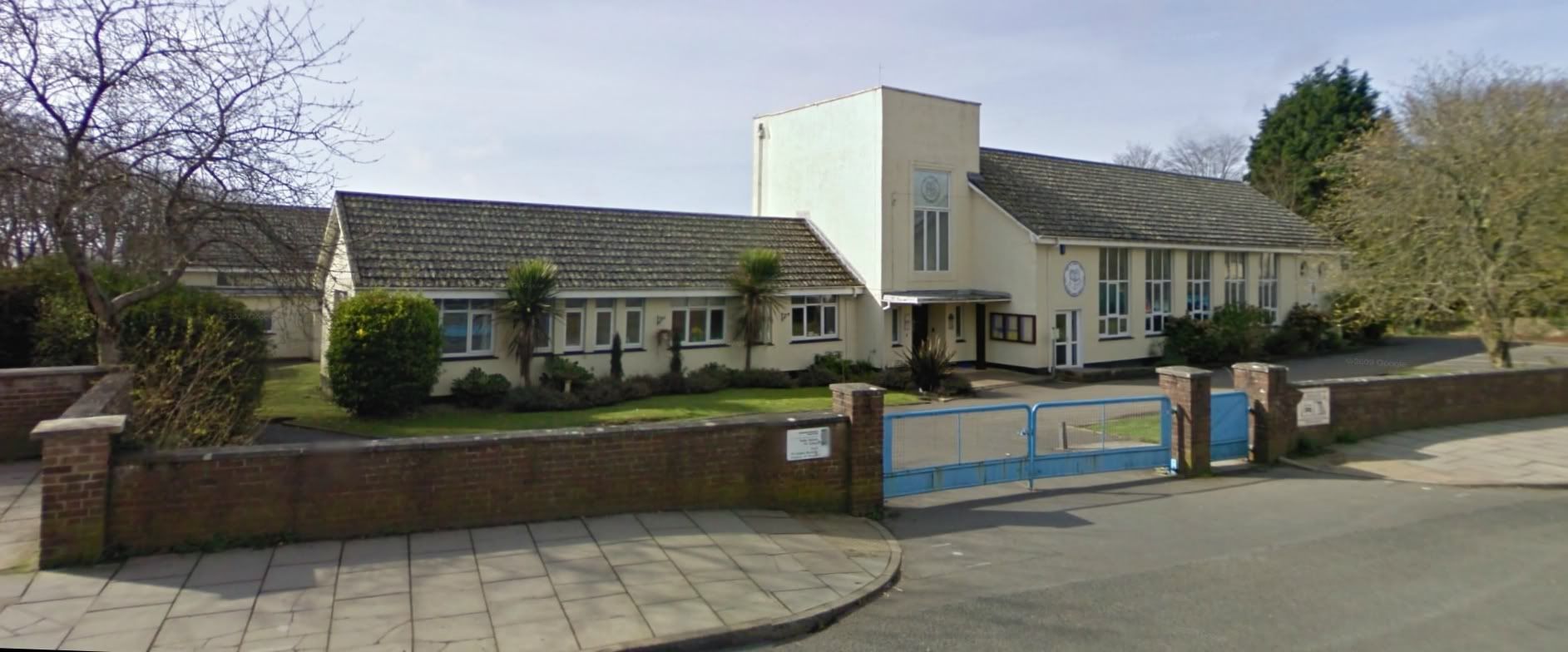For some time now—since the 1980s, to be precise—there has been a Welsh-medium stream at Tenby Infants and Tenby Junior Schools, which are on the opposite sides of Heywood Lane in Tenby, just over 100 metres apart. The junior school is above and to the top left of the satellite image, the infants school to the bottom right and below it.
Pembrokeshire Council has been under pressure to establish a new Welsh-medium school in Tenby for the last few years, and in February they announced that meetings had been held with education chiefs, governors and staff to consider three possible options:
Option 1 – Tenby Infants and Junior Schools to remain unchanged on two sites.
Option 2 – Amalgamation of both schools to a primary school on the Tenby Juniors site.
Option 3 – Amalgamate to a Welsh-medium primary school on Tenby Infants site and English-medium primary school on Tenby Junior site.
Option 3 was described as the "likely preferred option". Since then a series of preliminary public consultations has been held, resulting in this report by the Director of Education and Children's Services to Pembrokeshire's Cabinet last week.
In essence, the report says that there are considerable educational advantages to be gained by combining separate infants and junior schools into all-through primary schools on one site. In addition to that, the number of parents choosing the Welsh-medium stream has risen considerably in the past few years (there are currently 5 children in Year 6, but 13 in the Reception Year) and the numbers are projected to grow by 85% in the next four years.
So all in all, it does seem like a fairly obvious choice to create an all-through English-medium primary in the larger junior school building and a new Welsh-medium primary in the smaller infants school building; and this is what the report recommended. As we can read here, Cabinet agreed, and a formal consultation will now be launched.
If everything goes smoothly, the two new schools will open in September 2013.





17 comments:
Again this is good news. But without wanting to relive the debate of the last posting on a new school, it should be abuntantly obvious by now that opening a new WM school can be like watering a very delicate plant in sand. The water and investment seeps down and is lost.
Is there any tracking evidence of how many people who go to WM schools pass on Welsh to their children, send their own children to WM schools etc.?
With the opening of any WM school we need now to be looking at creating and strengthening WM facilities and networks around that school community.
The British state did this when they opening EM schools in Wales in the C19th century by making English the only official language and could then rely on mass literacy in English to take advantage of the abundant print and popular culture in English language to strengthen their language.
We can't do that with Welsh. But like the huge investment the British state made to turn Wales from a Welsh-speaking nation to an English-speaking one, we should be thinking holistically for the active promotion of Welsh with any new WM school and with existing schools which teach through the medium of Welsh.
Again, without wanting to distract from the good news nor go over old arguments, I'd be interested to hear how that can be achieved.
Without it, then I'm seeing very little evidence of a lasting effect of the 30+ years of 'growth' in WM education - it doesn't show up in viewing, listening or reading habits in the South East. Nor, unless there's a strong community of first language speakers and those who've learnt Welsh as an adult, of new networks being set up or strengthened by WM education.
M.
How many other Welsh medium schools has south Pembrokeshire got?
We do risk going over old ground, M. I would just repeat that WM schools are the best way of ensuring that children are competent in both languages. Without people being able to speak both languages, everything to do with promoting the language or encouraging use of the language will have no effect. It's one of the essential building blocks in a much more complicated building.
I also think that WM schools do in fact do the things you point to. They are often the focal point for wider use of Welsh in their communities.
I'm not at all sure about your last paragraph, though. You say, "it doesn't show up in viewing, listening or reading habits" which seems to imply that such information is available on a regional basis. So far as I know, it isn't. But if you know where to find it, please let me know.
-
There's only one fully fledged WM school, Anon. Glan Cleddau in Haverfordwest was set up in the same way as is now likely to happen in Tenby, by taking over the Prendergast Infants building. It's now running pretty much at full capacity, so it's probably time to look for the next expansion in provision. I think Milford Haven is the next likely location. There are two clusters of three schools: Mead Infants, Milford Haven Junior and St Francis's RC in Milford Haven; and Hakin (a combined primary, but still on two sites) and Hubberston CiW in Hakin/Hubberston.
There are two other dual stream schools: one in Gelli Aur/Golden Grove in Pembroke, and one in Arberth, if that counts as south Pembrokeshire.
"The British state did this when they opening EM schools in Wales in the C19th century by making English the only official language and could then rely on mass literacy in English to take advantage of the abundant print and popular culture in English language to strengthen their language.
We can't do that with Welsh."
Why not?
On a positive note it's been a delight to hear interviews with Wales rugby players who have been through WM education.....and on a slightly tangential note if we made it compulsory for every radio and tv advert broadcast in Wales to be bilingual i think we'd crack it.
It's very nice to see some links in one of your comments, Anon. However I've deleted both because you go on to include statements of supposed "fact" which are not supported by the evidence you've provided.
However I'll be kind to you and repeat the first part of the first comment:
It would be a good Idea to address the failure of WM schools to actually produce Welsh speakers. If you look at this:
http://wales.gov.uk/topics/statistics/headlines/schools2008/080326achievefsm/?lang=en
You can see the number of pupils and the percentage of pupils on Free School Meals in year 6, KS2 assessment in Welsh first Language 2005/2006.
If you look at this:
http://wales.gov.uk/topics/statistics/headlines/schools2012/120315/?lang=en
You can see the same cohort assessed at KS3 in Welsh first language and the FSM percentage 2008/2009.
If you look at this:
http://www.jcq.org.uk/attachments/published/1589/GCSE%20RESULTS.pdf
You can see the GCSE pass rates for that cohort 2010/2011 in Welsh.
To my mind the percentage success rate of WM schools is the A*-C pass number in 2010/2011 divided by the KS2 Assessment number in 2005/2006.
These figures don't show what you claim they show. If they show "the failure of WM schools to actually produce Welsh speakers", then by the same logic, the fact that only 61.3% of students got a grade C or above in English last summer would show the 38.7% failure of schools in Wales "to actually produce English speakers".
You're welcome repost the rest of what you wrote in that comment and your 07:09 comment if you provide the evidence to support what you claim.
I'll delete any comment which relies on "facts" that you can't provide evidence for, Anon.
OH, come on MH, you know that comparing fluency in English and Welsh by comparing GSCE grades is not quite the same.
The issue isn't one of being 'anti WM schools'. What I'd like us to see us discussing is strengthening the Welsh language.
Again, I can't get hold of facts but as a Welsh speaker I've tried holding very basic conversations with some (some, not all) people who've gone to WM schools and frankly it's embarrassing. I don't wish to attack WM - far from it nor those children either - I'm interested in developing and hearing a more holistic view of how we can create genuine Welsh speakers, that is, people who can use Welsh with ease and confidence.
You ask if I have facts to base my concern over the failure of WM in the South East? I don't think WM education is a failure, but what isn't happening to the degree one would hope is that Welsh is rooting itself in the community and I just don't know of facts which point to language transfere and use within people who've been to WM schools.
I'm looking forward to read the document refered to in this item on yesterday's BBC Cymru news site about developing Welsh centres for people who are learning Welsh: http://www.bbc.co.uk/newyddion/18773855 to see what they suggest about creating new living environments for people to use and learn Welsh.
Can I prove to a lack of rooting of the Welsh language in SE Wales? Well, there's not one Welsh language community radio station although there is quite a large number (on paper) of Welsh speakers within 30 miles of Cardiff. Compare this with the network of some 6 small Basque language community radio stations. In decades of listening to Radio Cymru or S4C I very, very rarely hear a voice of someone who's been to WM school from non Welsh speaking background. This is not scientific it's based on accent, where the caller is phoning from etc. There's no growth in readership of Welsh magazines; there are now new papurau bro since the 1980s; with 25%+ of the kids in the Pontypridd area going to WM schools for over two decades I don't remember ever hearing kids speak Welsh on the street in Ponty; Welsh medium chapels - with the exception of Salem in Canton - aren't seeing new member in great number (not everyone is religious etc but there is a strong cultural role for chapel in WM community); there are now new non-school based WM sporting clubs in the SE since founding Cymric in Cardiff in the 1970s; I'm not seeing Welsh used on shop window fronts or vans in the SE (again, with the exception of Canton in Cardiff). These are all the kinds of little signs as a Welsh-speaker, I would like to see and would prove to me that Welsh is growing. I'm no expert, but I don't see them. Maybe I've missed them, maybe I'm too pessimistic. I don't know.
Look, I'm not saying this to be negative, nor to attack WM education and distract from it's achievements. I'm saying this out of genuine concern. I just want us to develop a more holistic approach to the whole issue.
Catrin Fflur Huws's article in www.Gwerddon.org (online Welsh language journal) deals with this. http://www.gwerddon.org/rhifyn_8-132.aspx Of how a lower prestige language which has lost its natural domains (family, community) cannot rely only on getting high status (schools, laws) to promote people to use the language.
As you say WM schools are a foundation for attaining a language but without the community and cultural back-up then I think were deceiving ourselves if we think they are successful in creating Welsh speakers as many would wish to believe.
We need to discuss how this new WM school in Tenby can be part of a growing Welsh language community in the area.
M.
Read what I said again, M. I wasn't comparing fluency in English and Welsh by comparing GSCE grades. I only pointed out that the percentage that fails to get an A*-C grade is not an indication of how many students are unable to speak either English or Welsh.
The problem you speak of seems to me not to be WM education, but that you think I expect WM education to be some sort of magic bullet to transform communities. I don't. It's just one part of the equation. Other things need to be done too.
So if you feel there is a need to discuss how this new WM school in Tenby can be part of a growing Welsh language community in the area, please go ahead. I'm not stopping you. I'm just celebrating the fact that one new building block now looks likely to be put in place in a corner of Wales where some people would not expect any building activity at all. But many more blocks, beams, slates and a hundred-and-one other components will have to follow before we can think of holding a topping out ceremony.
These are the direct links to the new research document M referred to, both the Welsh and English versions. They're 147 pages long, so have fun.
MH thanks
.... yes, I've just noticed how long the document is!
Heini and Steve, if you're reading this, can you get a 15 page summary of the document?! 150 pages is too long for any document!
M.
A piece of academic research does need to be published in full, M, but it's not so bad because most of it is data and appendices. However there are summaries in both Welsh and English.
I read it last night and, in a nutshell, it says three things:
1. People need about 1,500 hours to become fluent. This is way below the time offered in most adult courses in Wales which tend to be based on one session a week and only amount to 300 or 400 hours over a few years.
2. Canolfannau Iaith in the more Anglicized areas are a very good idea because learners (and established speakers) need a place they can visit whenever they like where they know they'll be able to interact in Welsh.
3. If you want an example of how to do things well, look at the Basques.
I'd like to know your reactions to the Gruffudd/Morris paper, M. But I'd also like to put something new into the mix.
What you said about being embarrassed by the conversation you had is probably a little to do with the difficulties of talking to some teenagers in any language, where communication in grunts is, I'm quite convinced, part of a strategy to convey as little information as possible. If I can remember that far back, I'm sure I did too.
But it touches on an important point that you've mentioned, but in my words is about confidence and assertiveness in using the language, and how fragile that confidence sometimes is when transferred from the friendly environment of school or evening class into the far harsher world of Welsh speakers who often show little inclination to make any accommodation to people who don't speak the language in exactly the same way as they do. I don't think it's ability that's lacking, but confidence and assertiveness.
That ties in very much with the Basque situation, where there seems to be a real effort to take a learner past the "ability and competence" stage and equip them with "confidence and assertiveness" so they can throw their own weight around in the rough and tumble of the real Euskara (or Welsh) speaking world.
To me, that ties in very much with something Cynog Dafis is reported as saying in this article today:
"Mae e wedi dweud bod angen i'r mudiad iaith yn gyffredinol "ail-ddyfeisio" ei hun a "meithrin hyder a balchder" ymhlith siaradwyr Cymraeg."
For it seems to embrace an element that is to some extent lacking in both life-long speakers and learners. If I remember correctly, I had a converstion on ths blog with you about what you considered to be the low status of the language, and I didn't understand how you could think that way or, more precisely, allow others to set an agenda that allowed room for that way of thinking. I think we need to get off the back foot and be much more confident and assertive. That's the next big thing. As Cynog said, from now on the history of Welsh is going to be all about growth.
vans shoes
hermes outlet online
air max 2019
canada goose
golden goose outlet
nike huarache
coach outlet
christian louboutin
nike air max
balenciaga
Post a Comment